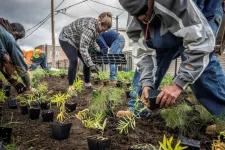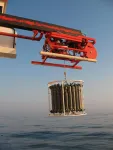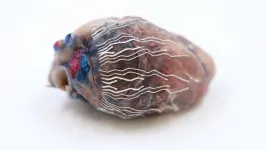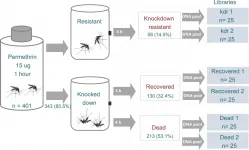A new rapid assessment to promote climate-informed conservation and nature-based solutions
Taking lessons learned from a decade of funding over 100 adaptation initiatives in conservation through the WCS Climate Adaptation Fund, authors offer a rapid assessment framework that can be used to facilitate climate-informed conservation and nature-bas
2021-06-17
(Press-News.org) A new article, published as a Perspective in the journal Conservation Science and Practice, introduces a rapid assessment framework that can be used as a guide to make conservation and nature-based solutions more robust to future climate.
Climate change poses risks to conservation efforts, if practitioners assume a future climate similar to the past or present. For example, more frequent and intense disturbances, such as wildfire or drought-induced tree mortality, can threaten projects that are designed to enhance habitat for forest-dependent species and sequester carbon. Overlooking such climate-related risks can result in failed conservation investments and negative outcomes for people, biodiversity, and ecosystem integrity as well as lead to carbon-sink reversal. Drawing from lessons learned from a decade of funding over 100 adaptation initiatives through the WCS Climate Adaptation Fund, the authors offer a simple framework that enables users to rapidly assess how--and by what means--climate change will require innovation beyond business-as-usual conservation practice.
This tractable assessment encourages practitioners and funders to use the "what, when, where, why, and who"--or the "5Ws"--of climate-informed action as a tool in project design and implementation. The "what," for example, means considering whether climate variability and projected changes will require taking new actions or modifying existing actions. The "who" asks users to consider: by whom, with whom, who benefits and who might bear potential harm or tradeoffs from project implementation and anticipated outcomes.
Using the 5Ws in practice can result in doing conservation differently in the warming world and help practitioners achieve their desired objectives. They use available science and local knowledge to address climate risks to traditional investments in reforestation, fire management, watershed restoration, and habitat protection. Take reforestation as an example: a traditional approach might aim to enhance habitat and carbon sequestration using seed or seedlings from historically-dominant tree species. Tree mortality due to unsuitable climate conditions could then lead to unexpected habitat degradation and reductions in carbon sequestration. A climate-informed approach favors native species that are expected to thrive under future climate. Seed or seedlings can be sourced from warmer and/or drier locations to assist migration to climatically-suitable areas. The 5Ws facilitates this process of figuring out what, if anything, should be done differently from the status quo.
"There's such a pressing need for adaptation," notes Lauren E. Oakes, the article's lead author. "So, we need to mainstream strategic actions that are robust to future climate change into conservation efforts and nature-based solutions across the world." There is a breadth of rigorous tools available for adaptation practitioners, but the complexity cost and time required to use them can stall their broad uptake. Oakes says the "5Ws" offers an initial, less daunting entry into the climate-informed planning process for practitioners endeavoring to make their projects more robust to future conditions. The authors offer this rapid assessment as a pathway to broader adoption of adaptation planning, an urgent need as investments in nature-based solutions continue to ramp up.
INFORMATION:
The article was co-authored by Lauren E. Oakes and Molly S. Cross, researchers on the Forests and Climate Change team at the WCS Global Conservation Program, and Erika Zavaleta, Professor at the University of California-Santa Cruz and former advisor to the Climate Adaptation Fund.
The WCS Climate Adaptation Fund is a program made possible through the generous support of the Doris Duke Charitable Foundation.
About the Wildlife Conservation Society
WCS saves wildlife and wild places worldwide through science, conservation action, education, and inspiring people to value nature. To achieve our mission, WCS, based at the Bronx Zoo, harnesses the power of its Global Conservation Program in nearly 60 nations and in all the world's oceans and its five wildlife parks in New York City, visited by 4 million people annually. WCS combines its expertise in the field, zoos, and aquarium to achieve its conservation mission. Visit: newsroom.wcs.org Follow: @WCSNewsroom. For more information: 347-840-1242.
About the Climate Adaptation Fund
The WCS Climate Adaptation Fund is a re-granting program for projects that advances effective interventions to help wildlife, ecosystems, and people adapt to climate change. Since 2011, the Fund has invested over $21 million in grant awards to U.S. conservation non-profits to catalyze innovative, science-driven projects responding to the impacts of climate change. To learn more, visit https://www.wcsclimateadaptationfund.org/
About the Doris Duke Charitable Foundation and the Environment Program
The mission of the Doris Duke Charitable Foundation (DDCF) is to improve the quality of people's lives through grants supporting the performing arts, environmental conservation, medical research and child well-being, and through preservation of the cultural and environmental legacy of Doris Duke's properties. The mission of DDCF's Environment Program is to ensure a thriving, resilient environment for wildlife and people, and foster an inclusive, effective conservation movement. For more information, please visit http://www.ddcf.org.
[Attachments] See images for this press release:

ELSE PRESS RELEASES FROM THIS DATE:
2021-06-17
The Black Sea is an unusual body of water: below a depth of 150 metres the dissolved oxygen concentration sinks to around zero, meaning that higher life forms such as plants and animals cannot exist in these areas. At the same time, this semi-enclosed sea stores comparatively large amounts of organic carbon. A team of researchers led by Dr Gonzalo V. Gomez-Saez and Dr Jutta Niggemann from the University of Oldenburg's Institute for Chemistry and Biology of the Marine Environment (ICBM) has now presented a new hypothesis as to why organic compounds accumulate in the depths of the Black Sea - and other oxygen-depleted waters in the scientific journal Science Advances.
The researchers posit that reactions with hydrogen sulfide play an important role in stabilizing ...
2021-06-17
New Brunswick, N.J. (June 17, 2021) - Babies born by cesarean section don't have the same healthy bacteria as those born vaginally, but a Rutgers-led study for the first time finds that these natural bacteria can be restored.
The study appears in the journal Med.
The human microbiota consists of trillions of bacteria, viruses, fungi and other microorganisms - some beneficial, some harmful -- that live in and on our bodies. Women naturally provide these pioneer colonizers to their babies' sterile bodies during labor and birth, helping their immune system to develop. But antibiotics and C-sections disturb this passing of microbes and are related to increased risks of obesity, asthma and metabolic ...
2021-06-17
Woodlands along streams and rivers are an important part of California's diverse ecology. They are biodiversity hotspots, providing various ecosystem services including carbon sequestration and critical habitat for threatened and endangered species. But our land and water use have significantly impacted these ecosystems, sometimes in unexpected ways.
A team of researchers, including two at UC Santa Barbara, discovered that some riparian woodlands are benefitting from water that humans divert for our own needs. Although it seems like a boon to these ecosystems, the artificial ...
2021-06-17
SAN ANTONIO (June 17, 2021) -- Middle-aged people with depressive symptoms who carry a genetic variation called apolipoprotein (APOE) ε4 may be more at risk to develop tau protein accumulations in the brain's emotion- and memory-controlling regions, a new study by researchers from The University of Texas Health Science Center at San Antonio (UT Health San Antonio) and collaborating institutions suggests.
The Journal of Alzheimer's Disease published the findings in its June 2021 print issue. The research is based on depression assessments and positron emission tomography (PET) imaging conducted among 201 participants in the multigenerational Framingham Heart Study. The mean age of these participants was 53.
Decades before diagnosis
PET scans typically are conducted ...
2021-06-17
LOS ALAMOS, N.M., June 17, 2021 -- A research team from Los Alamos National Laboratory and Purdue University have developed bio-inks for biosensors that could help localize critical regions in tissues and organs during surgical operations.
"The ink used in the biosensors is biocompatible and provides a user-friendly design with excellent workable time frames of more than one day," said Kwan-Soo Lee, of Los Alamos' Chemical Diagnostics and Engineering group.
The new biosensors allow for simultaneous recording and imaging of tissues and organs during surgical procedures.
"Simultaneous recording and imaging could be useful during heart surgery in localizing critical regions and guiding surgical interventions such as a procedure for restoring normal ...
2021-06-17
Nanodecoys made from human lung spheroid cells (LSCs) can bind to and neutralize SARS-CoV-2, promoting viral clearance and reducing lung injury in a macaque model of COVID-19. By mimicking the receptor that the virus binds to rather than targeting the virus itself, nanodecoy therapy could remain effective against emerging variants of the virus.
SARS-CoV-2 enters a cell when its spike protein binds to the angiotensin-converting enzyme 2 (ACE2) receptor on the cell's surface. LSCs - a natural mixture of lung epithelial stem cells and mesenchymal cells - also express ACE2, making them a perfect vehicle ...
2021-06-17
Current approaches for planning relocation for potentially millions of people affected by climate change and related risks are "woefully inadequate" and risk worsening societal inequities, experts wrote in a policy perspective on June 17 in Science. Policymakers and scientists need to rethink how they work together to develop, communicate and carry out relocation plans.
"Relocation involves moving people away from risk and into totally new settings," said the team of experts led by Richard Moss. Moss is a Gerhard R. Andlinger Visiting Fellow at Princeton's Andlinger Center ...
2021-06-17
The Yellow fever mosquito (scientific name, Aedes aegypti) spreads multiple untreatable viruses in humans and is primarily controlled using a pesticide called permethrin. However, many mosquitoes are evolving resistance to the pesticide. A new study by Karla Saavedra-Rodriguez of Colorado State University and colleagues, published in the journal PLOS Genetics, identifies mutations linked to different permethrin resistance strategies, which threaten our ability to control disease outbreaks.
When treated mosquitoes encounter permethrin in the wild, they will do one of the following: immediately die, be knocked out but recover, or be unaffected. Saavedra-Rodriguez and her colleagues decided to investigate the genetic variations that lead to these ...
2021-06-17
A new treatment approach focused on fixing cell damage, rather than fighting the virus directly, is effective against SARS-CoV-2 in lab models.
Combination of two drugs reduces spread of SARS-CoV-2 infection in cells by up to 99.5%.
If found safe for human use, this anti-viral treatment would make
COVID-19 symptoms milder and speed up recovery times.
When a person is infected with SARS-CoV-2, the virus that causes COVID-19, it invades their cells and uses them to replicate - which puts the cells under stress. Current approaches to dealing with infection target the virus itself with antiviral drugs. But ...
2021-06-17
Patents with all-female inventor teams are more likely than all-male teams to address problems that specifically or disproportionately affect women, according to a new study. The findings, derived from an analysis of more than 440,000 U.S. biomedical patents filed from 1976 to 2010, suggest that who benefits most from innovation largely depends on who gets to invent. While the gender gap in research and innovation is well known, its broader impact on what gets invented - and for whom - isn't well understood. To address this question, Rembrand Koning and colleagues used machine learning text analysis to evaluate all U.S. biomedical patents filed from 1976 to 2010. They found that patents ...
LAST 30 PRESS RELEASES:
[Press-News.org] A new rapid assessment to promote climate-informed conservation and nature-based solutions
Taking lessons learned from a decade of funding over 100 adaptation initiatives in conservation through the WCS Climate Adaptation Fund, authors offer a rapid assessment framework that can be used to facilitate climate-informed conservation and nature-bas





